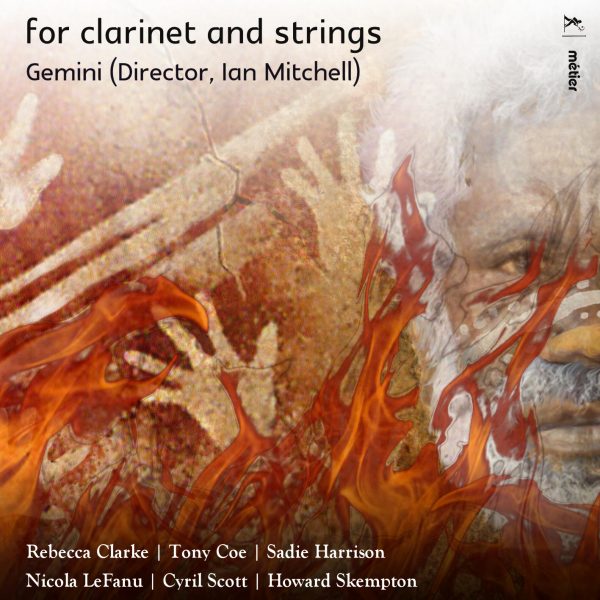American Record Guide
British clarinetist Ian Mitchell leads Gemini, a chamber ensemble that, since 1974, has carved out a niche in the field of educational concerts and the promotion of women composers. This album is a recital of works for clarinet and strings recorded over a quarter century (1995-2020), and it draws attention to English composers of the 20th Century and the 21st.
Rebecca Clarke (1886-1979) wrote her Prelude, Allegro, and Pastorale for clarinet and viola while stranded in the United States during World War II; and Rudolph Schmitt and Walter Herbert of the San Francisco Symphony gave the first performance at UC Berkeley on 6 August 1942. Cyril Scott (1879-1970) wrote his single-movement Clarinet Quintet for British clarinetist Gervase de Peyer, who teamed up with the Melos Ensemble to give the premiere in 1951. Howard Skempton (b. 1947) completed his ‘Lullaby’ for clarinet and cello in the summer of 1983, and Mitchell and cellist Helen Verney gave the premiere the following January. A decade later, at the suggestion of Mitchell, Skempton composed Gemini Dances (1994) for flute, clarinet, violin, cello, percussion, and piano.
Nicola LeFanu (b. 1947) wrote her Songs Without Words for clarinet, violin, viola, and cello in May 2005 to mark the 30th anniversary of the Gemini Ensemble; and the same month, the organization Musicians Against Nuclear Arms (MANA) gave the premiere. The final song is a memorial to people who perished in the current wars in the Middle East. Tony Coe (b. 1934), a well-known clarinetist, saxophonist, film composer, and jazz musician, expanded a commission by Mitchell to create his short programmatic clarinet quintet Dream Odyssey. Sadie Harrison (b. 1965) finished her Fire in Song for clarinet, viola, and two clap-stick-playing narrators during the catastrophic bush fires that swept Australia in 2019-20. In seven short movements she tells the creation story of fire as related by the Yolngu of Aboriginal Australians; and she posits how Aboriginal Australians would respond to the recent natural disaster. Most of the soundscapes are dark and modernist, including the uneasy post-romanticism of Clarke and Scott and the abstract utterances and disjunct themes in the Coe, the LeFanu, and the Harrison. Gemini performs with admirable skill and commitment; but Mitchell’s British clarinet dialect, which emphasizes the outer edges of the clarinet timbre, usually spreads above a mezzo-forte and sometimes creates an unpleasant blend. Skempton is a welcome outlier on the program, infusing his ‘ Lullaby’ and his Gemini Dances with folk-like tunes, resourceful scoring, and a beautiful simplicity that will remain with the listener long after the final track.
@divineartrecordingsgroup
A First Inversion Company
Registered Office:
176-178 Pontefract Road, Cudworth, Barnsley S72 8BE
+44 1226 596703
Fort Worth, TX 76110
+1.682.233.4978












